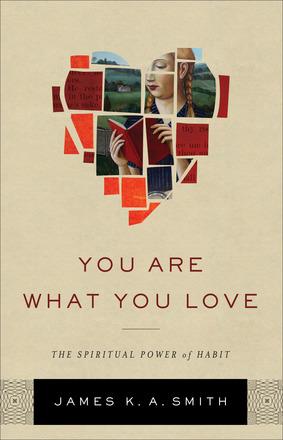You Are What You Love Named a Top Book for 2017

A line from the movie Talladega Nights flipped through James K. A. Smith’s mind when he first learned that his book You Are What You Love: The Spiritual Power of Habit was named a runner up in Christianity Today’s 2017 Best Book of 2017 the award
The professor of philosophy at Calvin College said he recalled what Reese Bobby, the father of NASCAR driver Ricky Bobby, said about winning in the 2006 movie comedy: “If you’re not first, you’re last!”
But that was a passing thought. “More seriously, the award is a nice confirmation of the reach the book is having in broader evangelical audiences,” said Smith.
Named the 2017 Best Book was The Crucifixion: Understanding the Death of Christ by Episcopal priest and author Fleming Rutledge. In her book, Rutledge looks at the various themes and motifs used by the New Testament evangelists and apostolic writers to explain the meaning of the cross of Christ.
Of his book, Smith said: “This was my first real attempt to write a ‘popular’ book—a book that is very consciously aimed at the proverbial reader ‘in the pew.’ ”
His other books such as Imagining the Kingdom: How Worship Works have been well-received, but they have tended to be academic and heavy with footnotes.
While he hopes the new book draws on and translates his work as a philosopher and scholar, You Are What You Love is written with a different voice. It has a more conversational tone; concepts are often explained through stories and analogies.
“It was a fun challenge as a writer, and I suppose this award is an indication that I pulled it off at least in part,” said Smith.
At the heart of the book is a twofold argument—two sides of the same coin, said Smith.
“On the one hand, I try to show—following St. Augustine especially—that what defines us and motivates us and moves us to action is not just what we know or think or believe, but what we love, what we long for, what we desire,” he said. “The heart is the epicenter of who you are.”
On the other hand, said Smith, he tries try to show that what we love is learned; desire is “caught” more than it is taught.
“And in particular, we learn to love by practice. That’s why love has long been understood as a habit,” he said.
“And that’s why we need to be attentive to the rituals and rhythms we give ourselves over to—the ‘cultural liturgies’ that become scripts for the heart. We might be learning to love the wrong things.”
This is why worship is really a training ground for the heart, what John Calvin called a spiritual “gymnasium,” because in the practices of Christian worship our hearts are tuned to God and his kingdom, Smith said.
Along these lines, who and what we love, and how those things define us, are apt to change over time. And in this process, his book considers how God’s grace can help to transform us and what we love.
In his book, Smith writes, “While being human means we can’t not love something ultimate—some version of the kingdom—it doesn’t mean we necessarily love the right things, or the true King.
“God has created us for himself and our hearts are designed to find their end in him, yet many spend their days restlessly craving rival gods, frenetically pursuing rival kingdoms.”
Smith’s book has also been named one of the best books of the year by the Englewood Review of Books.


